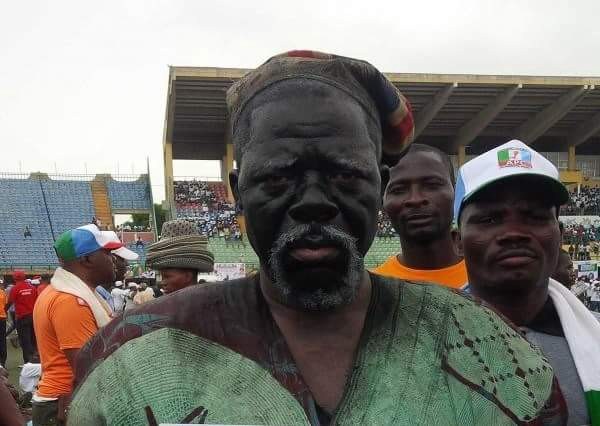CELLULOID: Unveiling Fadeyi Oloro, the known gunman

“Suke,” that’s the old man’s trademark refrain, often said after a life has just been cut short. In the world of Fadeyi Oloro, no life is too important to be taken away from the owner, with or without consent. For his dexterity as a disciple of the grim reaper, Fadeyi towers above his peers and his exploits remain etched in every movie lover’s memory.
.
So there is a part of my memory that houses him, that fascinating demon. Fadeyi Oloro, originally christained Ojo Arowosafe, is the old Yoruba cinema’s Deimos – the quintessence of terror in Greek mythology and one distinct thing defines his stage persona. Dread.
Fadeyi’s darkened face, sometimes made more horrific by excessive cosmetics, was perhaps a reflection of what dwelled in his ‘cinematic’ heart. Unlike the loquacious Arakangudu, Fadeyi rarely spoke; and he made no pretension to long, winding chant of incantations. All Fadeyi would not say with his mouth, he said loudly and, yes, violently through the barrel of the gun.
Fadeyi himself despised death, and he rarely acted in movies in which he would, by whatever design, be pronounced dead. Yet this man who would not accept to die, even if momentarily, killed people with fiendish delight: with a single shot, Fadeyi would snuff out the life of a hundred villagers. And his gun was no respecter of the dead; Fadeyi would kill a ghost again and again, transporting him to the place beyond the place beyond the great beyond.
.
A master dribbler, Fadeyi was the old Yoruba Nollywood’s response to Maradona. He would hide at the side of a lonely path and ambush villagers, mostly innocent travellers, make them wet their trousers––or more appropriately now, ‘Kijipa’––and, after a while, assure them he meant no harm. “Ko si wahala, e moo r’elu yin l’alaafia… “(No qualms, you may go to your villages in peace), he would say, tongue-in-cheek. The villagers would give thanks to Eledua and Obatala and their Ori for saving their lives. “E seun baba o,” (thanks, Old man) they would say and Fadeyi would retort, with cancerous smiles: “Ah, aidupe ara eni, eeyan’re nimi…eeyan’re nimi o…”(Never mind, I am a good man). Before seconds would chameleon into minutes, and just before the innocent villagers would finish counting their blessings, Fadeyi would have performed wonders.
.
“Boooooooooooooom!!!,” that’s Fadeyi speaking eloquently in the language of betrayal, through the barrel of his gun. The result was always a marvel: in split seconds, the innocent villagers would have had their lives mercilessly looted by Fadeyi and his marauding men. “Olorooooo Baba o!”, his disciples, all messengers of death, would scream.
For some wierd effect, Fadeyi would stagger backward for a few minutes, then stumble onward, his huge Agbada flowing behind him, and his men would surround him, providing an unsolicited agency of support. “Suke!” the old man would say, with maniacal nonchalance.
.
Ah, Fadeyi was a delight on the big screen!
.
Yoruba movies, now studded with bland comedies, seem to have moved away from Fadeyi Oloro’s era – an era defined by movies shot in traditional Yoruba settings, with ritual images, incantations, magic and all whatnot. To be sure, in terms of cinematic appeal and themes, those movies weren’t really Yoruwood’s best outputs (most were at best byproducts of elevated mediocrity) but they were central to our formative years, and, alongside other works of art, defined our exposure to indigenous (Yoruba) arts.
.
Ika l’omo ejo. Osa Eleye. Koto Aye. Eran Iya Osogbo. Lagidigba. Ogbori elemoso. Orogun Adedigba. Adele. Abore. Omo inu Oku. Omo oLufa. Ibinu Olukoso.
Of course those guys were excellent actors, even though unlike some of the wooden characters that assault our senses on screen now, they earned peanuts.
.
Beginning this month, this column wouod be dedicated to documenting the exploits of Fadeyi and his goons. Our concern would dwell, too, on that slayer of witches, Abija (Tajudeen Oyewole) and his ‘Ajan’, together with that diminutive Machiavelli, Kukute (Samson Folarin). We may look into the heart of that hot-tempered fiery fighter, Lalude (Fatai Ooodua) together with the one who chanted incantations like some terrible poems, Shokoti Alagbede-orun. Also important is that dark-skinned harbinger of disaster, Big Abass (Ade Ajiboye); the stone-hearted witches-romancing wizard, Ogunjimi (Ganiu Oyeyemi); the quiet one with serpentine venom, Alapinni Oosa ( Ganiu Nofiu); the boastful fighter of witches and other allied forces, Dagunro (Fasasi Olabankewin); the braggart who had a special interest in eye cosmetics, Arakangudu (Sikiru Adesina), among others.
The Ogogos (Taiwo Hassan) and Yinka Quadris of this world too may not be left out. It promises to be an exciting journey.
Sometime in 2018, I passed through the old ANTP meeting point in Meiran and saw a figure that looked like the old man, Fadeyi. Upon closer inspection, I realized he wasn’t Fadeyi; he was just his doppelganger.
Before the Nigerian social space was occupied by ‘unknown gunmen’, there was Fadeyi—-and he was a known gunman.
Suke!
———————-
This column, Celluloid, seeks to documents happenings on and off the big screen, with bias for indeginous talents. Follow Oladeinde on Twitter via @ola_deinde. (Premium Times)

